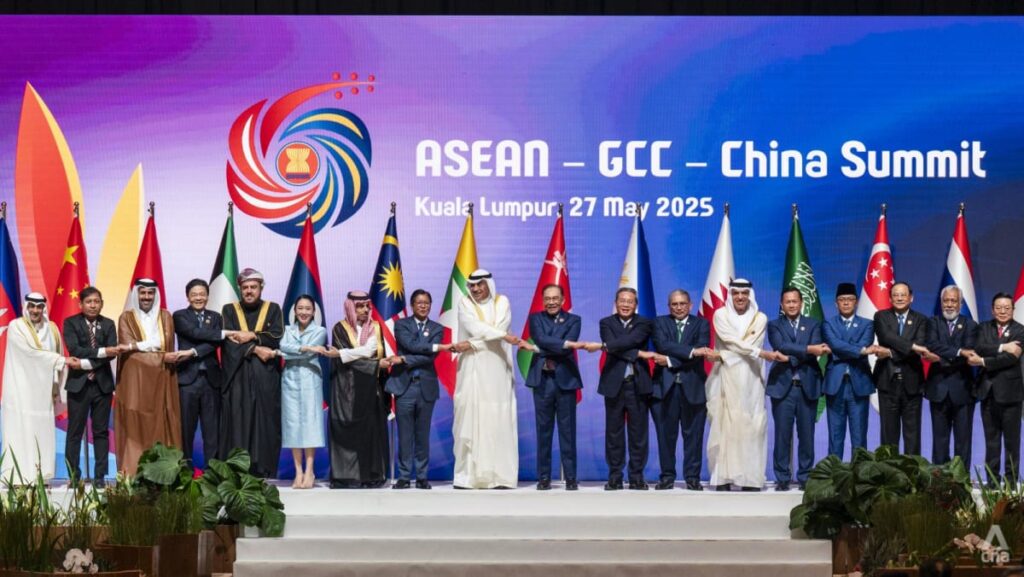Wrapping up the year’s first of two ASEAN summits, Anwar praised the “unprecedented” progress the Southeast Asian bloc has made over two days on several issues, including engaging more trade partners amid the US tariffs.
But ASEAN desires to do even more, Anwar told reporters on Tuesday evening, confirming that the bloc is in talks to sign a free trade agreement (FTA) with the GCC and is exploring the same with the European Union.
“FTA with GCC, FTA with EU, intra-ASEAN trade – everybody admits there is something more to be done, more concrete. So by October, we want to see results,” he said, referring to the second ASEAN summit Malaysia will host in October.
ASEAN has also reached a “consensus” on how it will respond to the US tariffs, Anwar said, stating that member states can proceed with bilateral negotiations with Washington but “not at the expense of” another ASEAN member.
“We can continue with bilateral engagements. But never, ever sacrifice the interest of the ordinary person and the interests of ASEAN as a whole,” he said.
“We talk about cohesiveness, working together, but in terms of intra-ASEAN trade, in terms of making a common decision to protect our turf in ASEAN, in geopolitical issues, sometimes we do not necessarily share (this cohesiveness).
“People have their own national agenda, but not this time.”
Thorny issues within ASEAN were also raised, Anwar said, referring to how Chinese Premier Li Qiang and Philippines President Ferdinand Marcos Jr discussed tensions in the South China Sea, both through the Malaysian premier and directly with each other.
ASEAN has also reached a consensus to continue to engage all parties on the Myanmar issue, he said, noting that the “focus now” is on extending the ceasefire and allowing humanitarian assistance to continue after the 7.7-magnitude earthquake in March.
“We appreciate the declaration of three-consecutive temporary ceasefires by the authority in Myanmar and the other unilateral ceasefires by other relevant stakeholders,” ASEAN leaders said in a statement released by Malaysia.
“We further called for the sustained extension and nationwide expansion of the ceasefire in Myanmar, as an initial step towards the cessation of violence, with a view to create a safe and conducive environment in ensuring the delivery of humanitarian aid and assistance.”
On Timor-Leste’s accession as a full member of ASEAN, Anwar said the bloc will do “whatever is necessary” to make this happen by October, subject to the country fulfilling “one or two” economic requirements.
“I’m not saying all issues can be resolved now, but at least there is a real, meaningful, positive engagement, and that is the new spirit of ASEAN,” Anwar added.
In a statement released late on Tuesday in response to global economic and trade uncertainties, ASEAN leaders noted the “continued rise in unilateral actions relating to tariffs and other trade and investment restrictions and the growing risk of global fragmentation”.
“We stress our strongest resolve to stand together as ASEAN in safeguarding the region’s economic stability, resilience, and long-term growth trajectory,” they said.
“ASEAN underscores that unilateral and retaliatory trade actions are counterproductive and risk exacerbating global economic fragmentation, especially when these actions create indirect impacts on ASEAN.”
The leaders pledged to further deepen internal trade and investment, upgrade ASEAN Plus One FTAs and the Regional Comprehensive Economic Partnership Agreement (RCEP), and improve ASEAN’s internal coordination by making full use of existing cross-sectoral mechanisms and the newly established ASEAN Geoeconomic Task Force.
“To this end, we task relevant ministers to monitor the current global economic challenges and to coordinate as appropriate for a strategic and coherent ASEAN response,” they added.
In a joint communique also issued late Tuesday listing key outcomes and agreements on wide-ranging issues at their summit, ASEAN leaders expressed “deep concern” over recent announcements by the United States to impose unilateral tariffs and “their potential impact on our economies”.
“The uncertainties arising from these tariffs and potential retaliation could heighten volatility in both capital flows and exchange rates. We will continue to engage in a frank and constructive dialogue with the US, and commit not to impose any retaliatory measures in response to US tariffs,” they added.

